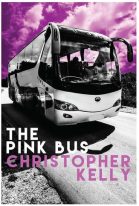 Kelly, Christopher. The Pink Bus. Lethe Press, 2016. 282 pages. $20.00. ISBN: 9781590214954.
Kelly, Christopher. The Pink Bus. Lethe Press, 2016. 282 pages. $20.00. ISBN: 9781590214954.
Patrick Monaghan is not who anyone would expect to run for United States Senator from Texas. A gay former reality star and current Texas State Senator known for his lefty viewpoint, his campaign is struggling. Trailing in the polls and hampered by infighting between his closest campaign insiders, Patrick is really counting on this speech to turn his campaign around. That is, until minutes into it, he is shot by an unknown assailant. The novel follows Patrick as he recovers the formative events of his life passing before his eyes. How did he get to where he is today? Will he survive? And will this turn the tide of an election that is not going his way?
Kelly crafts a sharp, fast-paced, and deeply engrossing novel with The Pink Bus. The story is told through a series of sections that detail different parts of Patrick’s life: Patrick as a young boy in middle school, Patrick as an unexpected reality star, Patrick and his experiences with the early realm of online hookup culture, among other scenes. In all, it paints the portrait of a man growing up in an age when being gay was an identity in transition, with all the missteps and foibles that that entails: from a fear and loathing-centered viewpoint from the AIDS-ravaged 1980’s to the burgeoning of a gay identity in popular culture in the late 1990’s and through the 2000’s.
By keeping the cast small, Kelly is able to give each of the main characters time to shine. Patrick can be self-centered and indecisive, but he ultimately is a likeable protagonist that the reader can’t help but cheer on. His best friend Nora can be sharp-tongued, but her devotion and loyalty to Patrick mixed with her fierce competence leave her a woman to be reckoned with. And even though campaign aide Oscar gets too attached to Patrick too quickly, he is a great counterpoint to Patrick and Nora on the campaign trail.
If there are any faults with this novel, it’s that some of the early scenes, at times, dip into cliché. The first gay person Patrick meets in the 1980s is his cousin who is dying of AIDS and who is subsequently erased by his family. When he’s in college, he has a tumultuous relationship with a girl he quasi-dates because he can’t admit his sexuality to her and their wider circle. However, common as these moments may have become in novels, they ring as incredibly real and true and they are handled deftly so that they don’t ever become moribund or turgid.
Overall, this book delivers on its promise: it provides a coming-of-age tale mixed with a political story that is very apt for the age. Kelly, to his great credit, gives his characters real problems to contend with, and he doesn’t let them off the hook with convenient solutions or magical thinking.
This book is recommended for any library that collects fiction for adults.
John Mack Freeman
